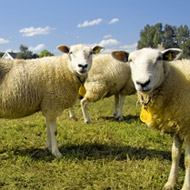
Smart technology gathers data on behaviour movement and gait
Vets at the University of Nottingham are developing a new, wearable device that can identify the early signs of lameness in sheep.
Until now, farmers have struggled to diagnose lameness early because there are no validated commercial tools available. But now a new device, developed in partnership with Intel and Farm Wizard, aims to change this.
The device consists of a sensing device worn on a sheep’s ear tag that gathers accelerometer and gyroscope data, effectively tracking the animal’s behaviour movement and gait.
Nottingham Vet School researcher Dr Jasmeet Kaler explains: “Our new system is a smart device – a wearable technology that we hope will be a game-changing investment for sheep farmers and a first for the industry.
“The algorithms we have developed are used to create different alerts for farmers. So far they have provided high accuracy in predicting various behaviours of the sheep, including differentiating lameness.”
Dr Kaler’s previous research found that just 20 per cent of farmers can spot and treat the early signs of lameness in sheep. It also revealed that the prevalence of lameness caused by footrot was much lower in groups of sheep where individual sheep had been treated early.
She continues: “I think what is very novel about this technology is that it utilises edge processing which means it doesn't necessarily need to send all the data to the Cloud because it does the thinking on the device.
"This is an advantage when it comes to battery life. We are currently validating the results in a larger trial and we hope the technology will be available after some further work.”



 The latest
The latest